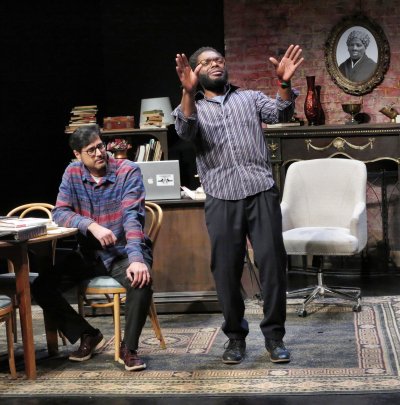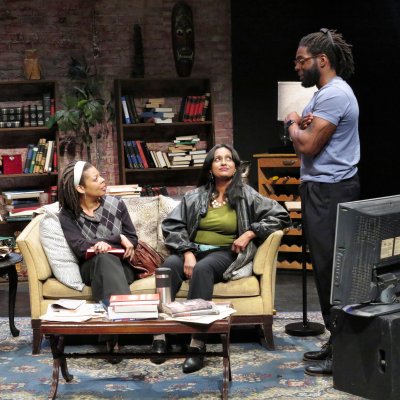The Conductor
Ismael Reed's latest play uses the revival of the Underground Railroad system as a device to address several contemporary socio-political issues related to race and ethnicity.

Imran Javaid and Brian Simmons in a scene from Ismael Reed’s The Conductor” at Theater for the New City (Photo credit: Jonathan Slaff)
[avatar user=”Scotty Bennett” size=”96″ align=”left”] Scotty Bennett, Critic[/avatar]
What happens when something from the distant past suddenly becomes a viable and necessary tool in the present day? People must turn to extraordinary means for protection and survival when restricted and demeaned to the point of exclusion in a once-accepting society. The solution may be a modern system patterned on the Underground Railroad from 1839 to 1863.
The Conductor, by novelist Ishmael Reed and directed by Carla Blank, is a play that uses the revival of the Underground Railroad system as a device to address several contemporary socio-political issues related to race and ethnicity. It is a show that directly addresses extremist conservative groups and their movements that seek to restrict and limit governmental and social actions used to address institutional inequality. Reed utilizes the result of a school board recall election in San Francisco as the basis for illustrating the insidious nature of these reactionary groups.
The show opens with Warren Chipp (Brian Simmons) wandering around his apartment, putting things in order. Then, he turns on his television to watch a news program on a racist channel called White Lightening TV. The commentator is Hedda “Buttermilk” Duckbill, effectively played by Laura Robards, with all the sanctimony one would expect from an intolerant person.
Duckbill’s report, an over-the-top racist commentary, introduces us to the main protagonists of the drama, Shashi Parmar (Imran Javaid), the former leader of a San Francisco school board recall election and currently a fugitive from a backlash against Indian-Americans, and Chipp, recently fired Black San Francisco based journalist.

Emil Guillermo and Laura Robards in a scene from Ismael Reed’s The Conductor” at Theater for the New City (Photo credit: Jonathan Slaff)
Chipp is a Conductor on a new version of the Underground Railroad, a system used by enslaved people escaping captivity from plantations in the American South from 1839 to 1865. This new system was set up in response to the United States suddenly turning against people with ancestry in India.
When Chipp’s next “passenger” arrives at his apartment, it turns out to be Shashi Parmar (Imran Javaid), the now disgraced leader of the school board recall movement, and, it turns out, the cause of the actions that ultimately cost Chipp his job.
What transpires over most of the first Act is a discussion of the origins of the Underground Railroad and how intolerance became endemic in the American social milieu. But, it is more of an anger-filled screed than a dramatic enactment of a debate on the issues related to the recall movement. The things being addressed are critically important to understanding how intolerance became inculcated into the character of many communities within the United States. Unfortunately, the way it is done in The Conductor is heavy-handed, as if a Wikipedia entry was being staged.
Act II opens on the following day, and the discussion turns to how the recall movement was manipulated by extremist conservative organizations whose ultimate goal is white-controlled authoritarianism. They support intolerance based on religion and ethnicity, restrictions on citizens’ rights, draconian limitations on immigration, severe restrictions on curriculums at all levels of education, and ultimately control of all local and national institutions.

Kenya Wilson, Monisha Shiva and Brian Simmons in a scene from Ismael Reed’s The Conductor” at Theater for the New City (Photo credit: Jonathan Slaff)
Reed rightly points out that these organizations exist in the United States and have been actively and increasingly influencing social and political commentary for at least the last 40 years. The discussion of these groups and their influence related to the recall election, and by extension, to the broader social and political environment, is more effective than the history lesson of Act I.
Act II introduces three characters who play essential and pivotal roles in the story. First, Kala Parma (Monisha Shiva) is the dark-skinned sister of Shashi Parmar, who can avoid being arrested and deported because her skin color allows her to “pass” as a person of color. Melody Wells (Kenya Wilson) is a reporter for a progressive San Francisco newspaper doing a story about the outside funding used for the recall election. She is working to expose the people financing the extremist conservative groups involved in the vote and the possible corruption of local officials. Finally, Gabriel Noitalide (Emil Guillermo), is a highly educated, former college professor brought to the United States by his parents when he was a child, and is being used by extremist conservative groups. They have co-opted him as proof that their actions are not based on intolerance. All of these actors are effective, given the limitations of the script.
Another aspect of these socio-political events and the groups involved that Reed addresses in Act II is the hypocrisy of some individuals within the groups. This important element is addressed surprisingly and impactfully and operates almost as a coda to the whole play. The sources of, and rationales for, the events leading up to Shashi Parma’s need to flee the country are revealed, and the impact of those revelations is dramatically played out.
The set design by Mark Marcante provides a realistic presentation of Chipp’s apartment, the location for the bulk of the production. The depiction of the White Lightening TV studio is more bare-bones but does work given the nature of the scenes involved. The light and sound design by Alexander Bartenieff is mostly effective, but there are issues with the music. At times it is too loud and distracting, and in one particular scene in Act II, it disruptively intrudes on an important discussion among Wells, Kala Parmar, and Chipp.
The Conductor (return engagement: September 7 – 10, 2023)
Theater for the New City
The Joyce and Seward Johnson Theater, 155 First Avenue, in Manhattan
For tickets, call 212-254-1109 or visit http://www.theaterforthenewcity.net
Running time: 90 minutes including one intermission






Leave a comment